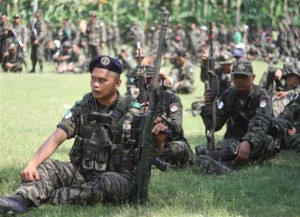
Members of the Moro Islamic Liberation Front gather at their stronghold at Camp Darapanan in Maguindanao province in southern Philippines to coincide with the tentative peace-signing agreement between the government and the MILF at Malacañang Palace in Manila Monday, Oct. 15, 2012. AP PHOTO/KARLOS MANLUPIG
COTABATO CITY, Philippines—Sumlay Mangindra knew how painful and difficult the fight for the Bangsamoro cause has been, even if she has not been into any battle herself.
She had lost her husband, Abdullah, during the government’s all-out war against the Moro Islamic Liberation Front (MILF).
“He told me to be ready to lose a husband for he was leaving to fight and defend the Bangsamoro, and he might not come home alive,” Mangindra recalled Abullah’s final words before he left for Camp Abubakar in 2000.
Mangindra, now 49, said she cried a lot, over the loss of her husband and the difficult prospects for raising her two sons, then aged 12 and 10, on her own.
At the time of the government’s all-out war, Mangindra helped support the family by selling vegetables here while her husband moonlighted as a pedicab driver when he was not on duty with the Bangsamoro Islamic Armed Forces (BIAF), the MILF’s armed wing.
They were a perfect example of a Moro family living in poverty; both were earning but their incomes were simply not enough to support their children.
When it was time for her sons to become BIAF fighters, Mangindra said she did not try to dissuade them.
Her sons, now aged 24 and 22, serve in the BIAF four times a week and the remaining days are spent with their families and as rice farmers in Sultan Kudarat, Maguindanao.
“They go to Camp Darapanan, the MILF’s main camp, to serve in the BIAF for four consecutive days as our family’s contribution to the struggle for self-determination,” she said.
When MILF leaders forged a deal with the government, Mangindra said she was hopeful but cautious.
When asked why, she said many government efforts to recognize Muslim rights had failed, including the current Autonomous Region in Muslim Mindanao.
Besides, “some interest groups might come along the way and they will attempt to derail the framework agreement, like other solutions tried in the past by the government.”
Mangindra continues to long for Bangsamoro independence. “Independence would have been the best solution to our problem, to our poverty, to our being less developed, and I am convinced it remains as the best solution,” Mangindra said.
She added that many Moros have always been and have remained “for independence.”
But Mangindra quickly added she was not questioning the wisdom of MILF leaders.
“The MILF is our official representative in finding peace in our homeland. What is good for us is best left to our leaders,” she said.
Mangindra said like the rest of the nation, Moros have been longing to live in peace.
She hinted that many wives and mothers like her would not have second thoughts about allowing their husbands and sons to go to war so they could live in peace— and that would mean achieving the Moro quest for self-determination.